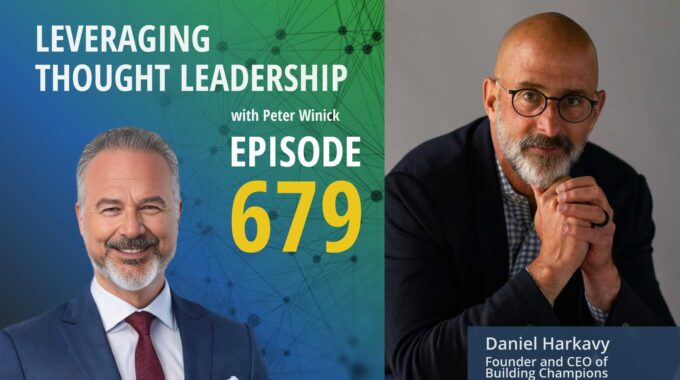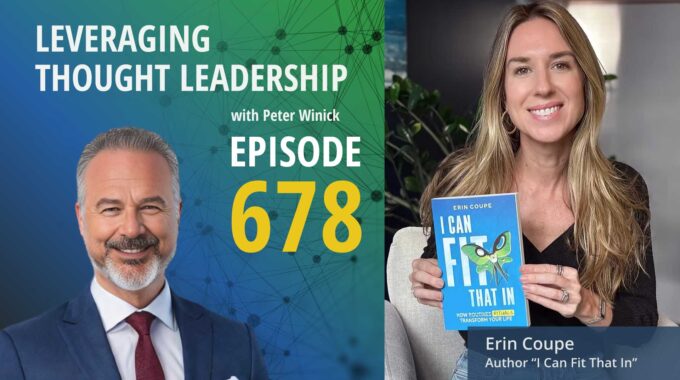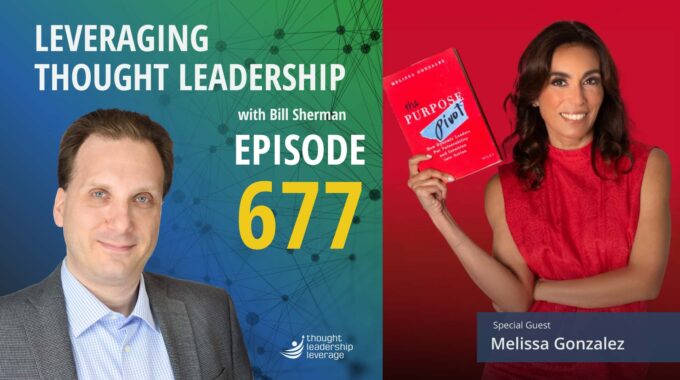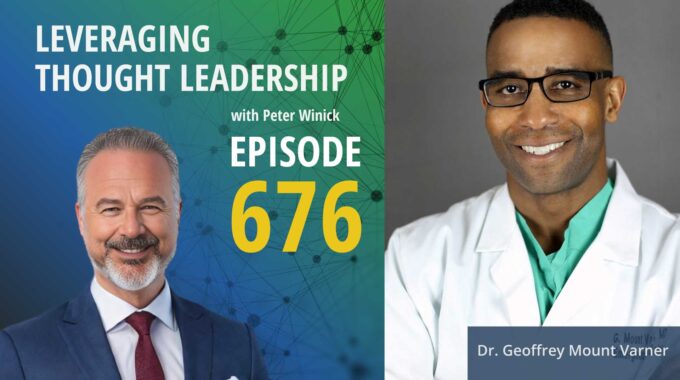A roadmap for leaders who want to multiply their impact — not their workload. This…
Accidental Thought Leadership: When a Minor Point Becomes a Major Movement | Ellen Joan Ford
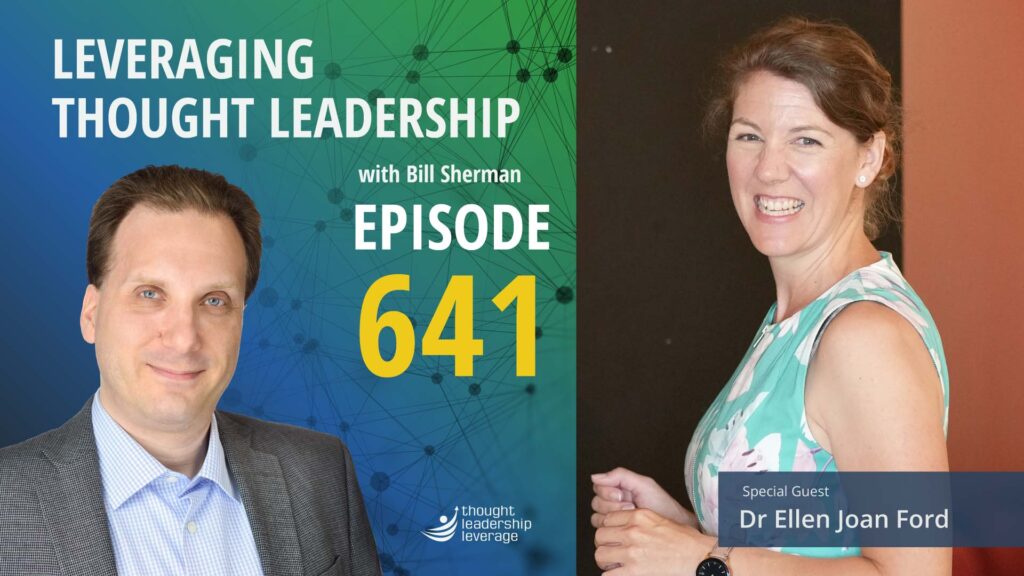
How a leadership expert is reshaping the future of work for parents everywhere
This episode explores how thought leadership can emerge from lived experience, especially when passion meets purpose. It examines the systemic challenges working parents face and how workplace norms can be reimagined through principles like #WorkSchoolHours. The conversation also highlights how individual action, storytelling, and persistence can drive large-scale cultural change in organizations.
Dr. Ellen Joan Ford didn’t set out to become a thought leader—she became one by accident, driven by action. A former army officer, academic, and founder of Belonging, Autonomy and Purpose Leadership, Ellen first spoke about the challenges of working parents as a small part of a leadership talk. But that minor moment struck a nerve—and sparked a tidal wave. Strangers reached out. Stories poured in. And suddenly, Ellen was leading a movement.
That movement became #WorkSchoolHours, a principles-based approach to workplace redesign. Through a TEDx talk, a book, and ongoing advocacy, Ellen challenges leaders to reconsider the structure of work—not just for productivity, but for humanity. Her research began informally, collecting real stories from overwhelmed parents, but it soon evolved into a mission grounded in compassion and backed by data.
Ellen’s leadership philosophy is shaped by three defining moments: serving in the military, becoming a parent, and helping evacuate Afghans to safety. Each began with getting “pissed off” enough to act—and that same passion drives her thought leadership today. But she’s not just collecting stories anymore. She’s implementing solutions.
In this episode, we explore how passion becomes platform, how impact is scaled through persistence, and how thought leadership can evolve from lived experience. If you’ve ever wondered how to turn a personal challenge into systemic change, this conversation will show you what’s possible.
Three Key Takeaways
Big impact often starts small. Ellen didn’t set out to lead a movement—she simply mentioned the challenges of working parents in a leadership talk. That small moment resonated deeply, leading to thousands of unsolicited stories and the creation of the #WorkSchoolHours platform.
Thought leadership is fueled by personal experience and action. Ellen’s credibility and influence stem from her lived experiences: leading in the military, becoming a parent, and coordinating a massive humanitarian effort. Her thought leadership emerged not from theory alone, but from taking action when she saw problems that needed solving.
Change begins when someone gets “pissed off enough to act.” Whether improving military leadership, reshaping workplace norms, or saving lives, Ellen demonstrates that passion, combined with persistence and a clear purpose, can spark real-world impact—even on systems as entrenched as the modern workplace.
If this conversation sparked your interest in how empathy and personal experience can fuel workplace transformation, don’t miss our earlier episode with Scott Shute, former Head of Mindfulness and Compassion Programs at LinkedIn. Like Ellen Joan Ford, Scott turned personal conviction into a platform for change—advocating for compassion as a strategic business imperative. Together, these episodes offer a powerful look at how thought leadership can humanize work and reshape what leadership looks like in today’s world.
Transcript
Bill Sherman Can prostration be the spark for lasting impact? Dr. Ellen Joan Ford thinks so. From her military leadership to academic research, Ellen has channeled her drive into helping workplaces become more inclusive, especially for working parents. As founder of the Work School Hours Movement, she’s amplifying a powerful message. Work should align with real life. In this episode, we unpack how Ellen’s passion turned into thought leadership and how she’s building momentum, one story, and one solution at a time. I’m Bill Sherman, and you’re listening to Leveraging Thought Leadership. Let’s begin. Welcome to the show, Ellen.
Dr. Ellen Joan Ford Thank you, Bill.
Bill Sherman So I want to dive into the conversation of how you found your lane in thought leadership, right? Because… That wasn’t a straight line journey. You described it as people started coming to you. So if you would, what is your lane in thought leadership? What have you found that is what you talk about? And how did you get there?
Dr. Ellen Joan Ford My overall lane is leadership, which I realize is a really big broad umbrella. And I specifically look at the human part of leadership, so not necessarily on how to be strategically the best strategist, it’s all about the people stuff. So that’s kind of my lane. I came to it through a varied bunch of experiences, so leading soldiers in the That was, I spent 10 years serving in New Zealand and around the globe. So doing leadership practically, leading in the corporate sector, and then doing academic studies on leadership. So I did my MBA and PhD focused on leadership, and I’ve been involved in a lot of other leadership activities over the years. So that’s kind of what brought me into leadership. But one of the things I’m specifically passionate about, Bill, is improving experiences for working parents. And so I had a bit of an interesting experience of how that kind of came to me. So I wonder if that’s what you’d like me to share more about. So I’d done all this other research on leadership, and I was starting to talk at events and share some of my journeys about, you know, what leadership is, what it isn’t, how we can do it. And one of the topics, which was actually quite a minor part of my talks, I just talked about the challenges of being a working parent and how leaders can do more to include their parents that are in the organization in a way that benefits everyone. And it was after that bill, totally unintentionally, all these people just started reaching out to me, wanting to share their stories of being a working parent. And so not by design, certainly not with the same rigor that my PhD had, I ended up embarking on this pretty significant post-doctoral piece of research about the experiences of working parents. And when I kept hearing all the same stories, which I can share with you soon, I thought, oh my goodness, I’ve got to do something about this, sorry. That’s kind of how I found that passion about the working parents, but.
Bill Sherman And it’s evolved to the point where you have a hashtag basically that you use in a platform name for what you talk about. So what is that hashtag and let’s talk about that for a moment.
Dr. Ellen Joan Ford Yeah, sure. So it’s hashtag work school hours, which is not as dogmatic as it sounds. It’s a principles based approach to how we can do work differently. So it would have been, Oh gosh, just over three years ago now, Bill, I did a Ted talk or a Tedx talk on it. Um, I have now written the book on it and yeah, had the hashtag, lots of material post about on social media about how we do work differently with the hashtag work, school hours. And that all came out of this kind of accidental research on working parents.
Bill Sherman I want to go back to something that you said. You said it was a minor piece of the talk, but then people started coming to you. That could mean a number of different things, that you had a line of people standing after the talk waiting to say, oh my gosh, I resonated with this, or maybe the better question is, how did people start coming to? And how did it go from a trickle to a larger flood?
Dr. Ellen Joan Ford Yeah, that’s a good question, Bill. So kind of a little bit of all of that. So yes, it’d be people would come and chat with me after the talk, but then I just started getting like messages. So either emails or messages on Facebook or LinkedIn, uh, often from people I didn’t know, I don’t know how they heard that I cared about this, but it was sort of from a friend of a friend. And when I, it was kind of like, as it grew, it then grew and grew. I was like, oh wow, I’ve kind of got 50 different bits of data that I wasn’t expecting. And then so I started thinking about it. And then I’d talk more about it, so I remember, you know, I’d go to swimming lessons for my son and I’d just be sitting there talking to the other parents and I would just be talking about this. And then they started telling me their stories and it kind of became this almost ongoing talking point. And then the people that I’d spoken with and they’d talk to me in person would then tell their friends, oh, guess what, I talked to this woman, Ellen. On the weekend about challenges of being a working parent, and then those people would then reach out to me. And so it was genuinely not how you do proper academic rigorous research, and I’m really aware of that, so I don’t pretend it’s anything other than what it is. But within the space of six months, I had, I’m not kidding, like more than 500 kind of bits of data in different forms, whether it was an email, a conversation, a Facebook And they just were telling the same story. And that was, gosh, three years ago. I now had thousands of these kind of bits of data that are all in different forms.
Bill Sherman I want to ask a follow up question here. So what was it that was prompting people to reach out to you? Sometimes in thought leadership, it’s you’re so excited about an idea that other people get excited. Or I could see in this case, maybe there were people who wanted to tell a story who didn’t know anyone was listening or collecting these stories. Why do you think they started? Sending these unsolicited to you.
Dr. Ellen Joan Ford So okay I think there’s three reasons. If I say firstly it’s what you said at the end so maybe people just hadn’t felt heard or seen and they reached out to me because they I don’t know thought that I was approachable or kind of had a kind listening ear. The second one is what you said at first was that I became excited about it. So that wasn’t so much in the early stages But it is now, you know, I get flooded with stuff now. Because I am so excited about it. So I’m excited and that’s what brings more people in, but that again, wasn’t actually how it was at the start. I think the third reason is because what I was talking about on stage that kind of started that process is I had served in the military, I then did research about leadership and I did my case study on the military. And then from that, I then ended up actually advising to the military and the reason I’m saying this point is because. I was then a civilian at that point, I’d been out of the Army for quite some time, but I worked with the Chief of the New Zealand Army and his senior leadership team, advising them on the kind of results of my research about some of the challenges that leaders were experiencing and more importantly, how they could do things differently. The reason I share this is because I’m not for a second bill saying, yes, I’ve tick solved the army. That would be a gross exaggeration, but I am really proud to have made an impact. And so the army in New Zealand did genuinely make some policy changes to make things better as a result of my research. And so what I would say is some of the people who approached me about the working My parents’ staff knew that I had had this positive impact on making change. For the New Zealand Army, so I’m kind of guessing, I can’t say this for certain, that maybe people saw me as someone that can get stuff done, see a problem, do something about it and fix it. And so possibly that played a role in why people would reach out to me about the working parent stuff. Not because they thought I was going to fix their problem, but I don’t know, maybe saw me a change maker.
Bill Sherman Let’s stay there for a moment. When you and I talked before you mentioned a phrase that has stuck with me and it was about getting pissed off and taking action. And I think some, there’s several stories about that. Explain that phrase. First, you’ve talked about the military. I’d like to talk now about resettlement and context to you’re getting pissed off and taking action.
Dr. Ellen Joan Ford Oh sure, and you mean resettlement of the Afghans? Yeah. So that was, um, probably my third big example of getting pissed off and wanting to do something about it. So the first one was, you know, I was pissed off that leadership in the army, you could be better. So I wanted to do Something about it, the second one was pissed off about working parent experiences. So I want it to do, something about. But the third one, Oh Bill, it hit me unexpectedly. So this was August, 2021. And I remember very specifically, I was on parental leave at that time, second time around, so I had a baby and a three-year-old. I had just that month decided, I’m pissed off about the experiences of working parents, I wanna do something about it, something to do with leadership, gotta call it hashtag work school hours. I hadn’t figured it all out at that point, I just knew that I needed to do something. That very same month, the Taliban took over in Afghanistan. And Long story short, when I had served there 10 years prior, when I was an engineer officer in the army, I had locals in my team, and local Afghans who had worked for foreign government agencies such as the Defense Force, when the Taliban took over, were then in significant danger of their lives. And one of those people who had been in my reached out to me begging for help to save their life. And I just remember thinking, Bill, I, I mean, I have no idea to do that. I’m, I’m a breastfeeding mother with a three year old. I’ve just decided that I’m going to quit my day job, start my own business, change the world. Oh, how on earth would I do that? But yeah, of course I will. And I was, yeah, I was pissed off that these people were in danger. And I, was pissed that not enough in my opinion was being done to help them. And so I… Ended up, not really my choice, more it came to me, found myself in the heart of the situation and yeah, I can tell you the rest of the story, but that’s how I got involved in that task.
Bill Sherman So I hear a thread of passion through these stories, whether it’s about aligning work with the needs of parents or looking at better ways to structure the military or address issues there or making sure that people who needed help from Afghanistan received it. My question for you is Do you attack everything with this level of passion? Or are you selective? And if so, if you are selective, how do you think you should become a thing for you?
Dr. Ellen Joan Ford Oh, that’s a good question. So I mean, no, I can’t change everything in the world. You know, there’s lots of things that need addressing, you know, there’s, there there’s poverty in the word, there is violence in the world, you have these lots of, there are genuinely lots of horrible things happening in the road, by the way, I’m an optimist. I think the world is full of abundant wonderfulness. So I’m not saying the world’s all bad. It’s not, but there are, you there are millions of different causes that I could get behind and that’s just not possible. So I think for the three that I got involved in, I guess there was a personal element to it. So the military one, I cared about the army, like I’d served in it and I really loved the army and I was pissed off that they weren’t treating everyone as well as they could do. It was kind of personal. The working parents bit, likewise I was right in the thick of it. Baby and a three year old just thinking, oh my gosh this is my life again, I don’t this for me, and I don’t want it for other people. And I think the Afghan evacuation was, I’d worked with these people and I cared about them. I knew them as humans. They weren’t just some poor people on a different country that are in trouble. These were people that had been in my team. They had worked alongside me and I gave a shit about them and so I think that’s kind of what led to those tasks. Then to your next question about why thought leadership. So… It’s funny, Bill, I don’t kind of think of myself as, oh, I’m a thought leader, but I know that that is what I’m doing. I kind of just was like, I’ve had these experiences, quite varied, you know, been in the military, been an academic, becoming a parent, doing this volunteer task, but I kind just realized that they all, these experiences all kind of threaded together to shape what I believe about leadership and how we can achieve big things. And so… I guess I just sort of fell upon thought leadership. I was like, I’ve got to do something with all these learnings and experiences because I think the working world can be better.
Bill Sherman So would you describe yourself as an accidental practitioner of thought leadership?
Dr. Ellen Joan Ford Uh, yeah, probably. Like I didn’t sort of think in my career, right? I’d like to get into thought leadership and how might I strategically go about building capabilities in that area? No, not at all. It was just, I’ve got pissed off about enough things. I’ve been done something about some of these things and I reckon there’s some lessons to be learned out of it.
Bill Sherman And now, as you said, you’ve got thousands of examples and stories and the trickle has become a flood in terms of people reaching out to you on this topic in terms of parenting and work, right? If you’re enjoying this episode of Leveraging Thought Leadership, please make sure to subscribe. If you’d like to help spread the word about our podcast, please leave a five-star review at ratethispodcast.com forward slash LTL, and share it with your friends. We’re available on Apple Podcasts and on all major listening apps, as well as thoughtleadershipleverage.com forward slash podcast. Why has this become something that you stayed with, and do you see yourself continuing to stay with it?
Dr. Ellen Joan Ford Yeah, that’s a good question. So I think for the other two tasks, so the army bit, I completed my work with them and I kind of felt like my work there is done or as much as is realistic. With the Afghan evacuation, there were 563 people that my team and I got visas for and we now have every single one of them safely in New Zealand. So, your task finished, there was an end point. This one. Has the working world changed yet? No, it hasn’t. So my work is not done. I guess what I’m careful about though, is I don’t wanna be kind of the agony aunt that people come to for advice on how to be a working parent. That’s not who I am and what I do. Yeah, I’m absolutely saturated with that. Like I don’t need more stories. I’ve got, I know what the problem is. The work that I’m doing now is actually to solve it. So that’s my big thing, is I, I don, I have no desire to gather more data from the problems, I’m trying to put out solutions. And I love it when people share stories to contribute to that part of it now.
Bill Sherman You talk about pairing problems with solutions. And in this case, you’re being a voice for advocating those solutions. Whether that’s speaking, you’ve written a book, you’re considering a second, there’s a number of different modalities you’re using to get this message out. How are you solving what is a larger and more abstract problem than the other two that we’ve been talking about. How do you get your hands around getting to that solution piece?
Dr. Ellen Joan Ford So I guess the pragmatic side of me knows that I don’t see there ever been an end point to this bill. So I don t kind of see right. X, Y and Z will be ticked off. This problem is now solved. Sorted. I can move on. I don s see it realistically being like that. But what I would say, though, is the Afghanistan evacuation task in particular, it was Just very briefly, it was complex. It was the hardest, most challenging, emotionally draining, difficult, just complex task I’ve ever been involved in in my life. And somehow though we achieved it and no one thought that we would. I mean, I didn’t even know that we wouldn’t. It was kind of like mission impossible and we did it. That rightly or wrongly has given me a I don’t know, this, and I don’t mean it to be arrogant, because I’m really not, I’m full of self-doubt, don’t worry about that, I’ve got lots of imposter syndrome. But it has also given me this level of self efficacy that, holy shit, I did achieve that. I’m going to tackle this even bigger problem, and, I reckon, anything’s possible. Whether that’s stupid or not, I kind of don’t care. I’ve got this thing in me that, well, I know that I can do things that are quite difficult and hard. And I know I can’t do it by myself, but I can with others, you know, collaboration. And so, what does this look like? How do I solve this? I don’t have it all beautifully lined up that this will be the end point, you know when XYZ has happened. But what I use, I often have a phrase, which is, we live in a world. Where we are expected to work as if we don’t have children, and we are expect to parent as if don’t a job. That is our current world, and I don’t like it. I think it’s rubbish. And so what I want us to move towards is a world where it’s far more accepted and valued that of course, our workers are gonna have children. You know, 80% of the population becomes parents. For the human race to continue. We need people to breed. It’s a very normal part of life. So we need to just do more to make that normal in a workplace. And does that mean we change the hours of work to align with school? Well, yeah, sure, that could be part of it. But it’s so much more than that. It just getting us to a place where a parent does not have to feel terrible about themselves for leaving work to go and deal with a sick child, all because they want to go watch their kid play some in sports. That it’s just normal that well of course you can go and do that because you’re still going to get your work done. So sorry I think this is a bit of a waffly answer. Again I don’t have the clear like yes now we’ve finished and accomplished this task but I feel like there’s a spectrum and when there’s movement along the spectrum I know that it is going somewhere and I’ve got a long way to go Bill.
Bill Sherman And that’s going after what I was looking for in that sense of the small victories, what sustains you and how do you keep momentum? Because for something that’s this big in this abstract, you need a lot of persistence. What keeps you going?
Dr. Ellen Joan Ford You asked good questions, Bill. So I’ll give two answers to that. One, a little bit more raw, and then I’ll give you a more hopeful one. So the truth is it’s hard. You know, I’m a, I am a business of one. Uh, I, I have a lot of days where I aren’t and not necessarily on a stage talking and I have lots of self-doubt. Like, you know, Ellen, who the heck do you think you are? Like, gosh, who do you think you are thinking that you can actually change the working world? You know, almost, you’re ridiculous for even thinking that. So I have, I have lots of moments like that. So I don’t want to pretend that it’s all sugar-coated and I’m always upbeat because, because I’m not, I had lots of movements of thinking far out. Like, what am I, what do I do and who do I think I am being able to have an influence on this? So then the more hopeful answer, which is clearly does resonate because I am still doing it, I haven’t, I hadn’t stopped. I get little bits of feedback sometimes, unsolicited, where someone will say something to me. This is just a recent example. A guy reached out to me, a father, and he said, Ellen, I attended my son’s athletics day last week for the first time ever. Thank you for inspiring me and empowering me to achieve that. And that, I mean, I can feel it now. Like that stuff just warms my heart. And I think, yes, I’m making a difference. And so it’s those little bits of kind of unexpected feedback, either from a parent who’s had a positive experience or from a leader who said, hey, we’ve actually implemented some of the stuff you’ve suggested and it’s working. And so I can think, yes, that’s making a different to the people’s lives and that team. So that’s kind of the staff that sustains me. And I guess one other thing is I, you know, I always want to get books to speak on more stages because I want to share this stuff. So every time I get booked, I also take that as a bit of validation. Like, okay, well, they know who I am and what I’m going to be talking about and they’ve booked me. So there clearly is an appetite for these conversations. So that’s, yeah, I guess that sustains me.
Bill Sherman Thank you, Ellen. So as we begin to wrap up, I wanna ask you a couple of questions. First. Three years from now, what changes you have the magic wand would you want to see within three years that you could look back and say, this is working?
Dr. Ellen Joan Ford And you said I got a magic wand here. You’ve got a Magic Wand, Dream Big. Right. Well, a Magic wand is, it is normalized that the working world is relatively aligned with the school weeks. So whether that’s, and I’m not, you know, maybe the school hours need to change. I don’t know. That’s not my expertise, but whatever is deemed as the best and most effective learning mechanism for children. So whatever those hours, weeks, terms are, whatever that is, the working world is relatively aligned to that. Um, and of course there’s exceptions here. Hospitals are always going to be open 24 seven. I’m no, I’m, not an idiot, but if it was more normalized, that’s instead of having this nine to five as the normal. Subtly more aligned to the school schedule would be the norm. That would be my magic wand three years from now.
Bill Sherman And then my last question, looking back, what advice would you give your younger stealth on the journey of thought leadership?
Dr. Ellen Joan Ford Dream big and you can do this.
Bill Sherman Fantastic, that’s a great ending, Ellen. Thank you for joining us today for this conversation.
Dr. Ellen Joan Ford Thanks so much for having me, Bill, and great questions. Thank you. Really good questions. You got me thinking.
Bill Sherman Okay. You’ve made it to the end of the episode, and that means you’re probably someone deeply interested in thought leadership. Want to learn even more? Here are three recommendations. First, check out the back catalog of our podcast episodes. There are a lot of great conversations with people at the top of their game, and thought leadership, as well as just starting out. Second, subscribe to our newsletter that talks about the business of thought leadership. And finally, feel free to reach out to me. My day job is helping people with big insights. Take them to scale through the practice of thought leadership. Maybe you’re looking for strategy, or maybe you want to polish up your ideas or even create new products and offerings. I’d love to chat with you. Thanks for listening.


